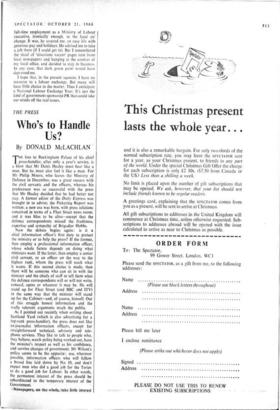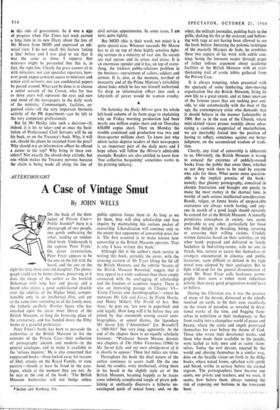Who's to Handle Us?
THE PRESS By DONALD McLACHLAN THE loss to Buckingham Palace of his chief press-handler, after. only a year's service, is a blow that Mr Denis Healey must bear like a man. But be must also feel it like a man. For Mr Philip Moore, who leaves the Ministry of Defence in December, was a great success with the civil servants and the officers, whereas his predecessor was so successful with the press that Mr Healey decided that he had better not stay. A former editor of the Daily Express was brought in to advise; the Pickering Report was written; a new era was born, with press relations conceived in terms of a Fleet Street news room; and it was bliss to be alive—except that the defence correspondents missed the frankness, expertise and sympathy of Brigadier Hobbs.
Now the debate begins again: is it a chief information officer's first duty to protect the ministry or to help the press? If the former, then employ a professional information officer, whose whole future depends on doing what ministers want. If the latter, then employ a senior civil servant, or an officer on the way to the highest rank, whom the press will teach what it wants. If this second choice is made, then there will be someone who can sit in with the minister and the chiefs of staff to tell them what the defence correspondents will or will not write, conceal, opine or whatever it may be. He will stand up for Fleet Street (and BBC and ITV) in the same way that the minister will stand up for the Cabinet—and, of course, himself. Out of this struggle honest information and the really relevant arguments reach the public.
As I pointed out recently when writing about Scotland Yard (which is also advertising for a top-rank press-handler), the press does not like ex-journalist information officers, except for straightforward technical, advisory and tele- phone services. They like to talk to people who, they believe, watch policy being worked out, have the minister's respect as well as his confidence, and survive changes of government. Mr Wilson's policy seems to be the opposite: use, wherever possible, information officers who will follow a broad line laid down by No 10, and don't expect men who did a good job for the Tories to do a good job for Labour. In other words, the permanent interest of the press should be subordinated to the temporary interest of the Government.
,.Newspapernwonathe,whole;ctalte little interest in this side of government. So it was a sign of progress when The Times last week carried a long item in its new Diary about the loss of Mr Moore from MOD and expressed an edi- torial view. I do not recall this feature 'taking a line' before and I was glad to see that it was the same as mine. I suppose that ministers might be persuaded that this is, in fact, the right line. Clearly the press cannot sit in with ministers; nor can specialist reporters, how- ever good, expect constant access to ministers and senior civil servants; nor can confidential papers be passed around. What can be done is to choose a senior servant of the Crown, who for two or three years will represent the eyes and ears and mind of the newspapers in the daily work of the ministry. Communiqués, facilities, or- ganised visits—all the very important Intourist activity of the PR department—can be left to the very competent professionals.
But let Mr Healey take such a decision—if, indeed, it is his to take—and at once the Insti- tution of Professional Civil Servants will be on his back, or on the Treasury's back. Why, it will ask, should the plums be snatched from the pros? Why should not an information officer be offered a career to the top? Why bring in these out- siders? Not exactly the closed-shop attitude, but one which makes the Treasury nervous because the claim is being made all along the line of civil service appointments. In some cases, I am sure, quite rightly.
But MOD (this is their word, not mine) is a quite special case. Whoever succeeds Mr Moore has to sit on top of three highly sensitive fight- ing services in a ministry of vast size. Its secrets are real secrets and its crises real crises. It is an enormous spender and it has, on top of every- thing, the trickiest public-relations problem in the business—recruitment of sailors, soldiers and airmen. It is, also, at the moment, terrified of insecurity and of the Prime Minister's irritability about leaks which he has not himself authorised. To drop an information officer into such a labyrinth of power would be wanton cruelty.
* On Saturday the Daily Mirror gave the whole left-hand column of its front page to explaining why on Friday morning production had been nearly one million copies short and on Thursday 650,000 copies short. Then on Monday the trouble continued and production was two and three-quarter millions short. To know just why union tactics deprive readers of their newspapers is an important part of the daily news and I hope others will follow the Mirror's admirable example. Readers are also entitled to know how `free collective bargaining' sometimes works in the printing industry.



































 Previous page
Previous page